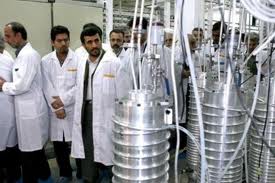 International sanctions designed to punish Iran for its nuclear program may be counter-productive, said scientists and security analysts tracking the decade-long dispute over the Persian Gulf nationís atomic work.
International sanctions designed to punish Iran for its nuclear program may be counter-productive, said scientists and security analysts tracking the decade-long dispute over the Persian Gulf nationís atomic work.While trade and financial sanctions have choked off Iranís access to materials such as aluminum and†maraging steel†used to make its first generation of nuclear equipment, they have spurred the Islamic Republic to find its own solutions for subsequent technological innovations. Now, Iran is positioned to both build better nuclear devices and export them.
ďThe serious consequence of all of these sanctions are that you drive the indigenous production of these parts,Ē Ferenc Dalnoki-Veress, a physicist at the Monterrey, California- based James Martin Center for Nonproliferation Studies, wrote in response to questions. ďThis means the proliferator learns more about the technology and so now they donít only know how to produce the parts, but they could also sell them to other states.Ē
As embargoes strangle Iranís ability to import high-quality metals and fibers needed to build nuclear components, the countryís own resources, including oil, sand and zinc, mean it can overcome technical hurdles. Last month, Iran notified United Nations International Atomic Energy Agency inspectors it would begin installing 3,000 domestically built centrifuges that can produce more enriched uranium in less time.
Raw Materials
ďMost technologies in use are decades-old, well-proven, well-published concepts,Ē said Andreas Persbo, executive director of the London-based Verification Research, Training and Information Center, a non-governmental observer to the IAEA. ďThe key thing is to get access to the raw material. If you have the raw material, and a talent base to process them, you can construct whatever you need.Ē
Iran, with the worldís fourth-biggest proven oil reserves, began in 2011 to make its own carbon fiber, the strong, light material used in wind turbines, airplanes and centrifuges. Like the uranium-enrichment market, which is led by a handful of companies such as Urenco Ltd.,†Areva SA†and Rosatom Corp., carbon-fiber production is driven by a few multinational businesses including†Hexcel Corp.,†BAE Systems Plc†and†Toray Industries Inc.
ďWhile the sanctions regime certainly slowed down Iranís technological progress initially, it has also made Iran self- sufficient in a number of key areas,Ē said Yousaf Butt, a physicist and nuclear non-proliferation analyst who advised the U.S. National Academy of Sciences on Iranís nuclear work. ďIran is likely the most technologically advanced nation in the Middle East, aside from Israel.Ē
Self-Sufficient
The Islamic Republic has also achieved self-sufficiency in other vital technology areas touched by sanctions. The country manufacturers and†sells Fomblin†oil, a lubricant used inside centrifuges, on world markets. At a September IAEA meeting in Vienna, Iran displayed a copy of a domestically made nuclear- fuel panel destined for a research reactor in Tehran.
ďIf in the past the country needed finished products and technologies for its program which squarely fell under sanctions, now the required level of imported inputs is continuously going down to more simple and basic items which Iran still needs but can upgrade on its own,Ē according to†Igor Khripunov, the Soviet Unionís former arms-control envoy to the U.S. who is now at the Athens, Georgia-based Center for International Trade and Security.
Kazakhstan Meeting
Iran, which maintains its atomic program is peaceful, has ruled out suspending its activities as the UN Security Council demands. Itís willing to discuss its nuclear work when it meets world powers in Kazakhstan next week, Foreign Minister Ali Akbar Salehi said Feb. 4. Talks between Iran and IAEA officials that concluded Feb. 13 in Tehran failed to clinch a deal that would give investigators wider access to alleged nuclear sites.
While Iran allowed wider access to sites, including centrifuge-manufacturing workshops, until 2005, it reversed course after accusations about its nuclear work escalated. The first UN sanctions were imposed in 2006. The country hasn't restricted IAEA access to sites itís legally bound to let inspectors visit.
Diplomats should focus on returning to greater transparency of Iranís nuclear facilities rather than trying to enforce a ban on enrichment, said†Paul Ingram, executive director of the London-based British American Security Information Council, a policy-advisory group.
ďIran has a sophisticated economy relative to most states outside of North America, Europe and the Far East, so it should be no surprise that they can develop the technologies to substitute for sanctioned materials,Ē Ingram wrote in reply to questions. ďThe experience of sanctions proves this time and time again.Ē
By Bloomberg
The Iran Project is not responsible for the content of quoted articles.










